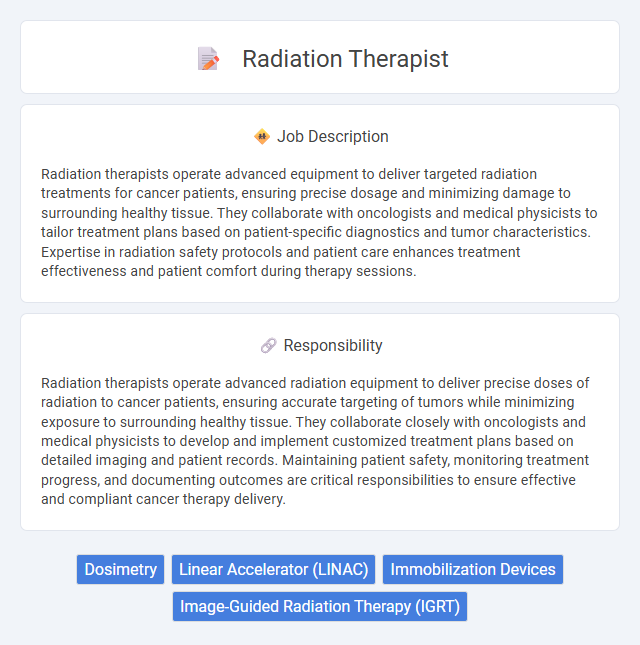
Radiation therapists operate advanced equipment to deliver targeted radiation treatments for cancer patients, ensuring precise dosage and minimizing damage to surrounding healthy tissue. They collaborate with oncologists and medical physicists to tailor treatment plans based on patient-specific diagnostics and tumor characteristics. Expertise in radiation safety protocols and patient care enhances treatment effectiveness and patient comfort during therapy sessions.
Radiation therapists likely need strong emotional resilience to manage the stress of working with cancer patients undergoing radiation treatment. Those with excellent communication skills and the ability to maintain focus during precise procedures may be more suitable for this role. Individuals prone to high anxiety or discomfort in medical settings might find the job challenging to sustain long-term.
Qualification
Radiation therapists typically require an associate's or bachelor's degree in radiation therapy or a related health science field, along with certification from the American Registry of Radiologic Technologists (ARRT). State licensure is mandatory in most regions, involving successful completion of a board exam and adherence to continuing education requirements. Strong knowledge of radiation physics, anatomy, and oncology, combined with clinical experience, is essential for effective patient care and treatment planning.
Responsibility
Radiation therapists operate advanced radiation equipment to deliver precise doses of radiation to cancer patients, ensuring accurate targeting of tumors while minimizing exposure to surrounding healthy tissue. They collaborate closely with oncologists and medical physicists to develop and implement customized treatment plans based on detailed imaging and patient records. Maintaining patient safety, monitoring treatment progress, and documenting outcomes are critical responsibilities to ensure effective and compliant cancer therapy delivery.
Benefit
Radiation therapists likely enjoy competitive salaries and comprehensive healthcare benefits, contributing to overall job satisfaction. The profession often provides opportunities for career advancement and specialized training, which may enhance long-term earning potential. Work-life balance and job stability are other probable benefits that attract individuals to this healthcare field.
Challenge
Radiation therapists likely face challenges in precisely targeting cancerous tissues while minimizing exposure to surrounding healthy cells. They probably need to stay updated on evolving technology and treatment protocols to maintain accuracy and patient safety. Managing emotional stress from working closely with patients undergoing difficult treatments may also be a significant challenge.
Career Advancement
Radiation therapists play a critical role in oncology, administering targeted radiation treatments that require precision and expertise. Career advancement opportunities include specializing in advanced technologies like intensity-modulated radiation therapy (IMRT) or stereotactic radiosurgery (SRS), pursuing certifications such as the Certified Radiation Therapist (CRT) credential, and progressing into roles like dosimetrist or radiation therapy manager. Continuous professional development and mastery of emerging radiation delivery techniques significantly enhance prospects for leadership positions and involvement in clinical research.
Key Terms
Dosimetry
Radiation therapists specializing in dosimetry precisely calculate and measure the radiation doses for cancer patients to ensure optimal treatment efficacy while minimizing exposure to healthy tissues. They utilize advanced software and imaging technologies to design individualized radiation treatment plans based on tumor size, location, and type. Expertise in physics and anatomy enables dosimetrists to collaborate closely with oncologists to enhance patient safety and treatment outcomes.
Linear Accelerator (LINAC)
Radiation therapists specializing in Linear Accelerator (LINAC) operation deliver precise external beam radiation treatments for cancer patients, ensuring accurate targeting of tumors while sparing healthy tissue. They calibrate and maintain LINAC equipment, interpret treatment plans, and collaborate with oncologists and medical physicists to optimize dose delivery. Expertise in LINAC safety protocols, patient positioning, and computerized treatment planning systems is essential for effective and safe radiation therapy administration.
Immobilization Devices
Radiation therapists utilize immobilization devices to ensure precise patient positioning during radiation treatment, minimizing movement and enhancing target accuracy. Common devices include thermoplastic masks, vacuum cushions, and custom molds, which are tailored to each patient's anatomy for effective immobilization. Proper use of these devices improves treatment outcomes by reducing radiation exposure to healthy tissues and increasing overall therapy effectiveness.
Image-Guided Radiation Therapy (IGRT)
Radiation therapists specializing in Image-Guided Radiation Therapy (IGRT) use advanced imaging technologies such as CT, MRI, and X-rays to precisely target tumors during treatment. They collaborate closely with oncologists and medical physicists to adjust treatment plans in real time, ensuring maximum radiation dose to cancerous tissues while sparing healthy cells. Proficiency in IGRT improves treatment accuracy, reduces side effects, and enhances patient outcomes in cancer care.
 kuljobs.com
kuljobs.com